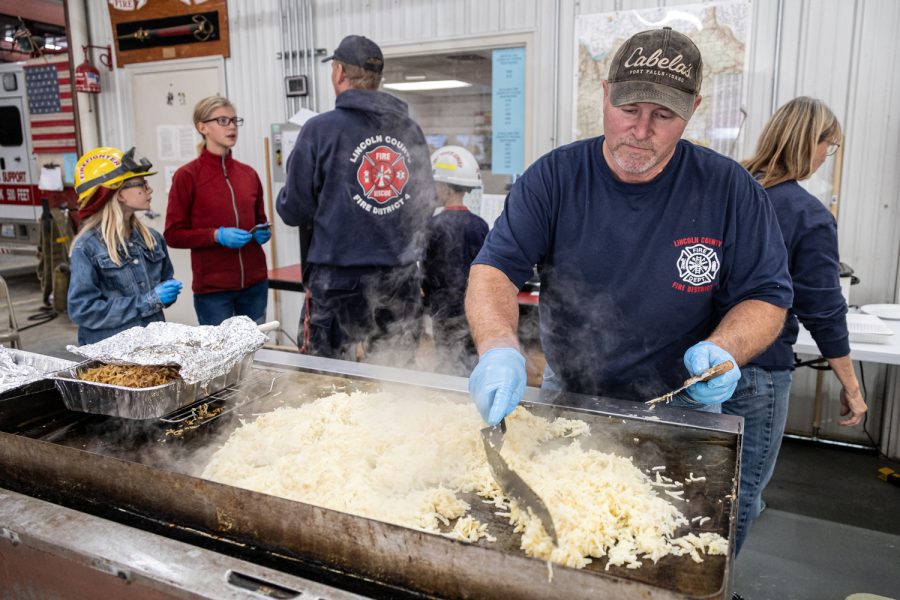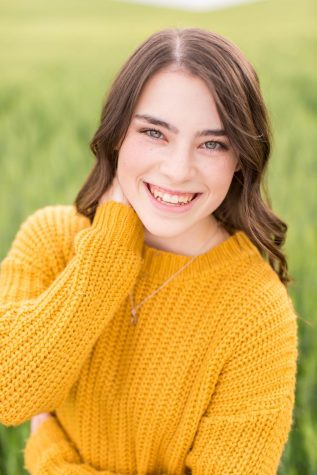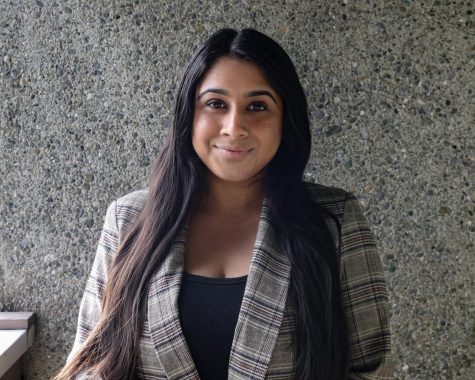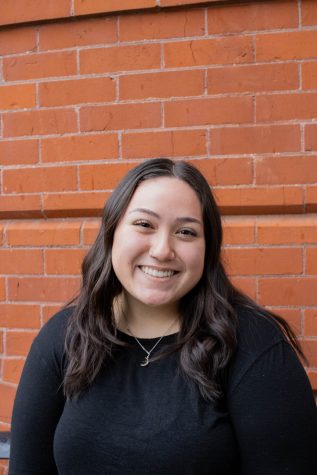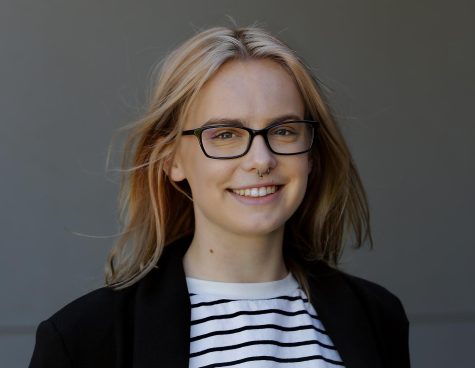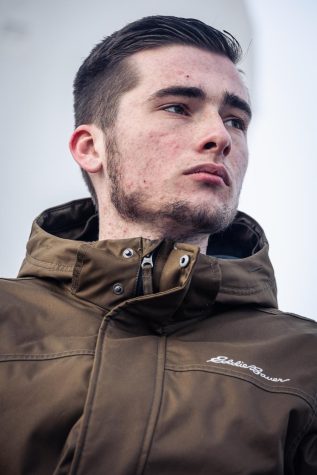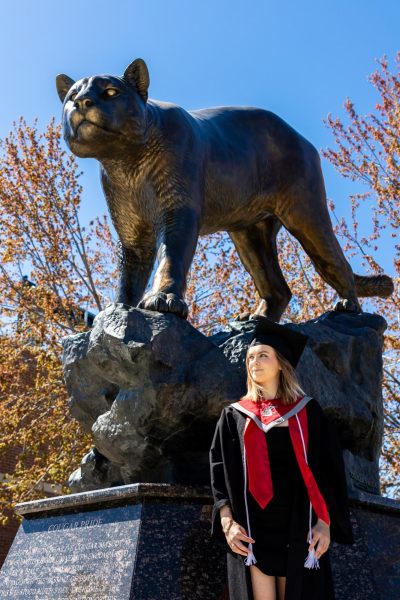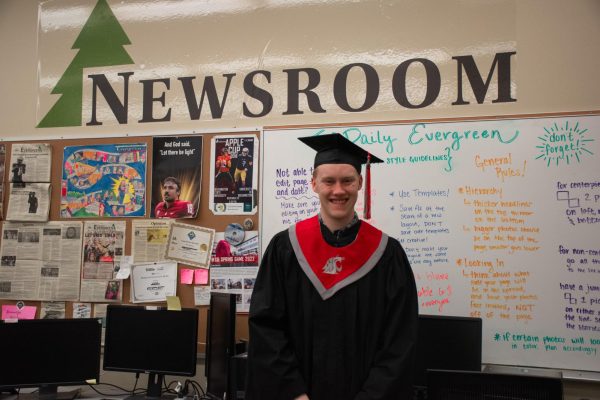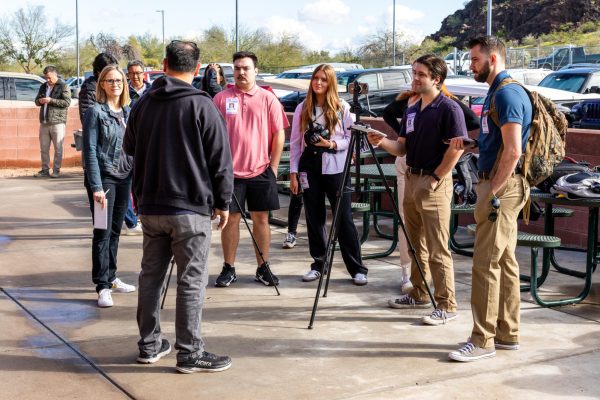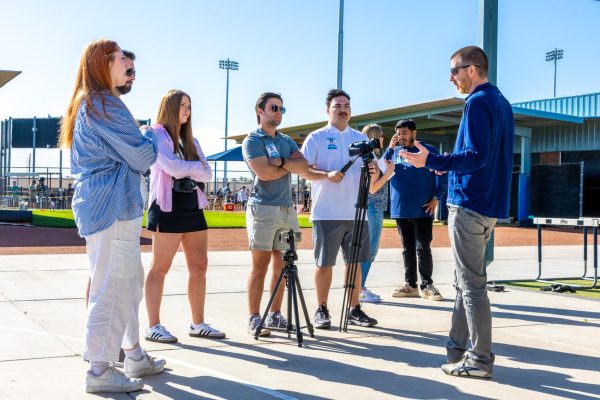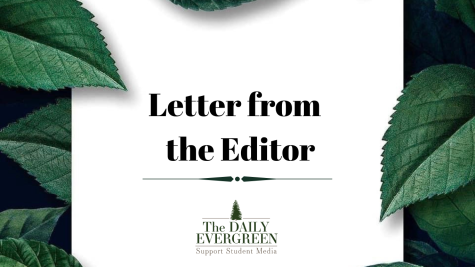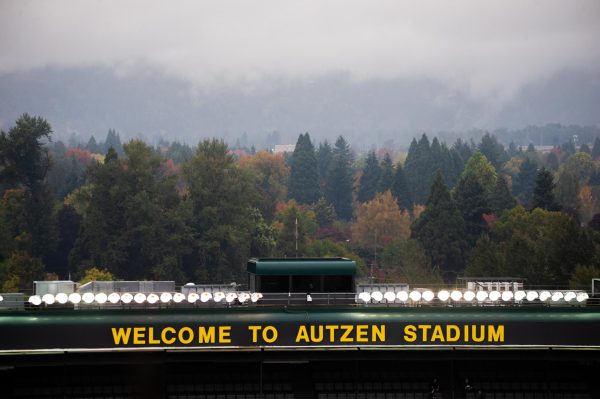Daily Evergreen reporters take the plunge
Students drive to rural communities, report on local stories
Volunteer firefighter Blake Blauert cooks hashbrowns during Lincoln County Fire District Four’s annual Hunter’s Breakfast fundraiser, Oct. 15, in Reardan, Wash.
October 19, 2022
In under 24 hours, The Daily Evergreen reporters drove to rural communities, many of which they had never heard of before, and searched for local stories of what makes their town unique.
Sponsored by a grant from the Solutions Journalism Network, Edward R. Murrow College of Communications students participated in the Rural Reporting Plunge from Friday to Saturday.
Here are a few of The Daily Evergreen reporters’ experiences.
Puneet Bsanti
The streets were empty, except for a few cars driving by on Tekoa’s main street. We did not know what to anticipate when we arrived, however, the small town exceeded our expectations at the end of the day.
My group and I arrived in Tekoa around 9 a.m., and once we parked and got out of the car, the local librarian Shelly greeted us. The library was not open, but she was doing some work and saw us park next to the building.
Shelly spoke to us for about 20 minutes, describing the town and the people in it. It was obvious that she loved living in Tekoa and knew everything about it. Shelly was the first of many Tekoa residents we spoke to who gave insight into the town, as well as taking the time to answer many of our questions.
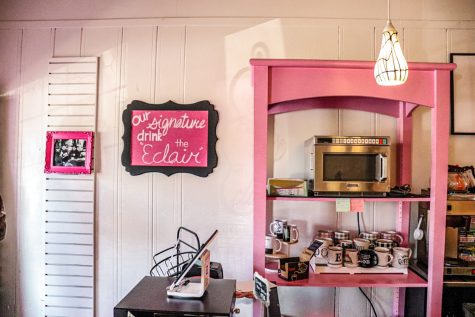
Eclair’s, signature drink was rich with espresso and filled with custard, Oct. 15.
My groupmate Alisa and I went to the local coffee shop called Eclair’s and were met with the color pink everywhere. The walls and chairs were painted pink, and the menu had the most creative coffee drinks I had ever seen. The barista recommended the Eclair, which was its signature coffee. The drink was rich with espresso and filled with custard.
My favorite part of this trip was when I unexpectedly met a Punjabi couple who were celebrating the one year anniversary of their local market in Tekoa. I did not anticipate meeting many people of color, let alone people who were the same race as me.
Karan and Karam Kingra were handing out free pizzas, and they said they had 500 with them. I spent a lot of my time speaking to the couple, especially with Karam, who was also a teacher at the local Tekoa elementary school. She was very kind and reminded me of many women in my family who are strong and smart.
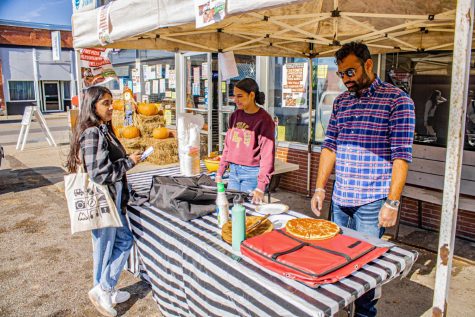
Puneet Bsanti speaks with Karan and Karam Kingra, Oct. 15.
Karam described her love for Tekoa and the people who were kind to her. She said they embraced her and Karan and their culture. She said the fields of Tekoa reminded her of Punjabi fields, and she even made Indian food once and gave it out to residents at the school, who loved trying it.
Karan and Karam’s story inspired me, and I decided that if I ever did get the opportunity to report on Tekoa, I would want to profile their family and the market.
The Rural Reporting Plunge reminded me of one of the reasons why I want to become a journalist: because of the people. I want to write about people like Karam and Karan who not only inspire me, but the general public. Every Murrow College student should take the opportunity to partake in this project because it pushes you to become a better reporter and takes you out of your comfort zone.
Alexandria Osborne
This weekend, I traveled about half an hour west of Spokane to the small town of Reardan. With a population of 471 as of 2020, the town seemed to be very tight-knit.
The town’s fire station was volunteer-based, which is what really stuck out to me from that trip.
My team went to the station twice that weekend to talk to as many volunteers as possible. Friday night, we heard about a ‘Hunter’s Breakfast’ they were hosting the following morning. It turns out this fundraiser was their only fundraiser each year.
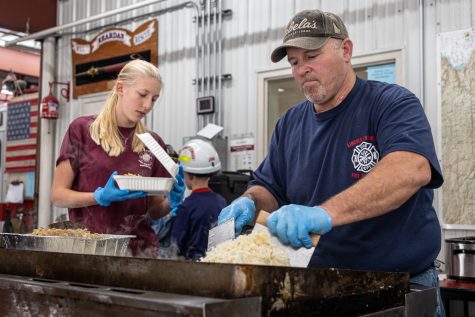
Volunteer firefighter Blake Blauert cooks hashbrowns during Lincoln County Fire District Four’s annual Hunter’s Breakfast fundraiser, Oct. 15, in Reardan, Wash.
I talked to a few of the volunteers Saturday morning, and it was clear everyone was there because they wanted to and definitely not because they had to.
Every volunteer I spoke to said something along the lines of wanting to help the community. The volunteer fire chief said this was “neighbors helping neighbors,” which really moved me. I could really see how much everyone cared about each other in the community.
The fire chief let my team ride on top of a fire truck that morning as well, and I got to spray a hose around a block for a few minutes. It was honestly super fun. I’ve been in a fire truck once before, but nobody ever drove it while I was in there.
Everyone at the station was open to helping us with questions we had and finding things to do in the town.
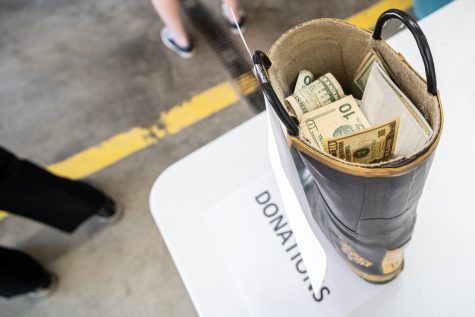
Community members donate money to the fire department during Lincoln County Fire District Four’s annual Hunter’s Breakfast fundraiser, Oct. 15, in Reardan, Wash.
Friday night, we went to the Reardan High School football game against Lind-Ritzville. While Reardan High School lost, it was still a good experience. There weren’t a lot of students in the stands, but a previous football player mentioned that was normal for the town.
On Saturday, we found this insanely beautiful dam. My phone kept going in and out of service, but that gave me the chance to really tap into the nature aspect of it. We were stopped at this fence, which definitely eased my nerves because of how steep the hill was.
But, it was still gorgeous.
I’ve said this multiple times, but my experience in this small town was amazing. The community members were more than willing to help us out, the sights were amazing and it was just all-in-all an eye-opening trip because I’ve only ever lived in big cities.
Saydee Phothivongsa
My team got to go to Pomeroy, which has a population of around 1,200 people. The Friday we arrived, Pomeroy High School had a home football game. It just so happened that it was their homecoming game, which was so exciting!
The stands were packed with students, supportive parents and community members, which showed how important the sport is to this town. Coming from the rural Washington town of Nine Mile Falls myself, being at this game brought back fond memories I have from attending my own high school’s games, as the atmosphere was very similar.
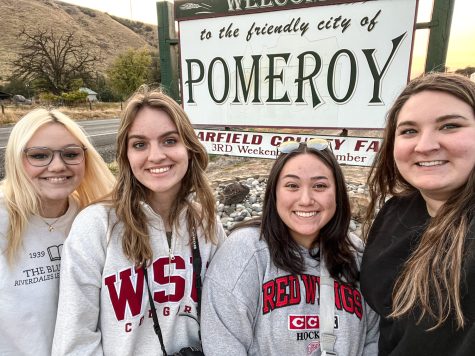
Saydee Phothivongsa (third from the left) visits Pomeroy with her group members.
Saturday was a bit quieter in Pomeroy, and only a few shops downtown were open. As we wandered around the town, I found myself entering an art gallery, where I met a sweet lady named Bea. We talked for a while, and she told me a bit about her life and the gallery, which she volunteers at as a shop-sitter. Bea told me that as she’s grown older, she volunteers for several places around town.
“I retired so I could volunteer,” she said with a hearty laugh, which in return made me laugh.
Just from that one sentence, it was clear she loves the town and the people so much that she still feels the need to be involved. This particular interaction has stuck with me because it felt good to be in a journalism setting and like I was just having a conversation and getting to know someone without already having a preconceived story idea in mind.
I feel this trip was extremely valuable in refining my journalism skills. Particularly, in approaching people. I am fairly shy, so the thought of approaching strangers and making conversation is a bit frightening. This plunge pushed me out of my comfort zone for sure, but it was also a great growing experience.
Frankie Beer
When I arrived in Harrison, it was silent.
The town’s off-season had begun, a stark difference from its bustling summer months of parties and boating on Lake Coeur d’Alene.
My reporting group soon stumbled upon local restaurant/bar One Shot Charlies, one of the only businesses that is open during the fall and winter months.
Glass bottles lined the back shelves next to a drink menu written in brightly colored chalk. Dim lights and loud laughter washed over us as we chatted with servers, who regaled us with tales of staffing shortages – college students leaving town in the first weeks of August – and earning enough money from generous tips to sustain them during the winter.
Harrison treats newcomers like family, they said. The minute you walk through the door, you might be greeted with “‘Who are you? What’s your story? What’s your name? Where’d you come from? Tell me everything.”
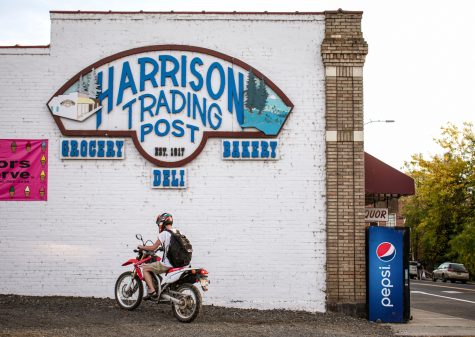
Harrison’s Trading Post serves soft serve ice cream and minimal groceries, Oct. 14.
And I found this to be somewhat true, at least with the locals my group had the privilege of speaking with.
As we entered the local public library the next morning, two young circulation specialists immediately greeted us with offers of hot tea in fall-themed mugs, not minding an hour-long conversation about Harrison’s fire over 100 years ago and locals’ struggles to start their own businesses in town.
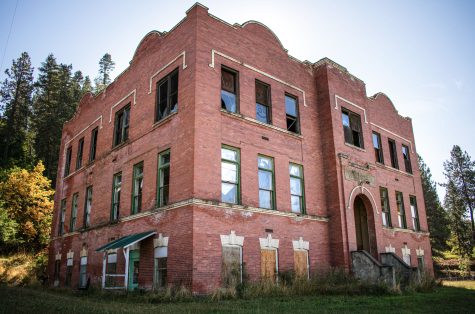
An abandoned school is one of the last standing buildings after Harrison’s fire 105 years ago, Oct. 15.
The self-described “guardian[s] of countless worlds” told us they feel a sense of responsibility to ensure Harrison is cared for by their generation, so locals become involved with the town and feel comfortable gathering at the library for a “hub” of communication.
Whether it is hosting community dances and sonnet-writing workshops for teenagers or planning to start a new bakery and coffee shop to address locals’ needs, Harrison residents are finding ways to come together during the off-season.
As we left our lakeside view and returned to the wheat fields, we reflected on our time in Harrison. Although it was short, I definitely gained more insight into striking up conversations with strangers and finding stories that have not yet been told.
If you were to ask me whether or not I would tear open a yellow envelope “Amazing Race”- style to discover a new small-town destination, frantically interviewing lovely residents over the course of 24 hours again … I believe I’d say yes.

